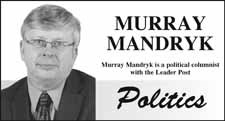Many rural Saskatchewan residents may be wondering about all the fuss and bother over private liquor sales in the cities.
Rural Saskatchewan, after all, has been the home to private liquor outlets pretty much since it's been legal to sell booze in this province.
But like most things in Saskatchewan politics, the issue is slightly more complicated than the debate on the surface suggests. Let us observe.
Saskatchewan Liquor and Gaming Authority (SLGA) Minister Donna Harpauer announced last week that her Saskatchewan Party government would be allowing three full-service private liquor stores - two in Saskatoon and one in Regina.
In one way, the news was expected and consistent with what Premier Brad Wall's government believes in. In another way, it was also inconsistent with what he has said.
The consistent aspect is that the philosophically business-minded right-wing Sask. Party believes whole-heartedly in business running things. Arguably, less philosophically consistent was Wall's promise made to urban voters and the unions that a Sask. Party government would not sell government-owned liquor stores in the cities and larger towns.
But by allowing "new" liquor stores to be privately run will be seen by many as good political compromise in which Wall doesn't go back on his word not to privatize, but still stays true to his philosophical beliefs that the retail booze sales business shout not be in government ought hands.
Moreover, it would seem to make sense for the government to not have to pay the capital costs of building new liquor stores - money that could go to building roads or hospitals. The successful private sector bidders will have to build their own stores.
Already, we have some 180 private rural outlets selling hard liquor in rural Saskatchewan. We also have private beer off sales in both rural and urban hotels and now urban wine stores. Having a few full-service private liquor stores would seem the next logical progression for a province growing a changing.
But it's also about here where what Wall, Harpauer and the Sask. Party are proposing gets into murky when it comes to what may best serve the people's interests.
For starters, the new private liquor stores will be allowed to keep longer hours, giving them a competitive advantage over government stores. In fairness, Wall has hinted SLGA store hours may change. But for now, the extra hours private stores will be open will be a huge for their sales - especially given that they will also have huge pricing advantages because they will set be able to set their own prices.
The new private stores will get 16 per cent off SLGA prices - a better deal than the 15.3-per-cent reduction that rural liquor outlets currently receive. And private stores will be able to bring in products not currently offered through the SLGA. (However, all liquor sales will have to subscribe to a "social reference" minimum price that prohibits giving away cheap booze.)
Again, it can be argued that such measures are necessary for any private outlet is to compete with government-run liquor stores. But given that the new stores won't necessarily have to pay Saskatchewan Government and General Employee (SGEU) wages, they would already seem to have a built in advantage.
Of course, some may rightly argue that subsidizing wages of government workers who are doing the same work as others in the retail sector is precisely what's wrong with government being in the retail liquor business.
But what should also be noted about government-run liquor stores is they have been highly profitable, offering taxpayers income that offsets the costs of roads, hospitals and schools.
Yes, we won't be building government liquor stores. But will what taxpayers gain in capital cost savings be lost in revenues to private business?
Private liquor stores may still be a good idea. But they may also come with a cost.
Murray Mandryk has been covering provincial politics for over 15 years.




